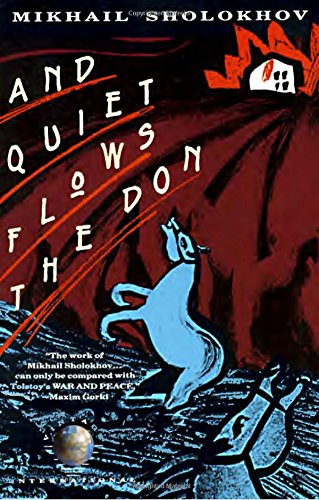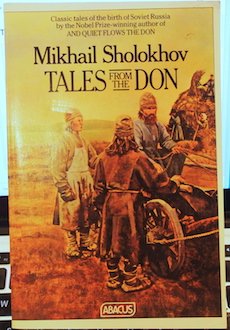Mikhail Aleksandrovich Sholokhov was a Soviet/Russian novelist and winner of the 1965 Nobel Prize in Literature. He is known for writing about life and fate of Don Cossacks during the Russian Revolution, the civil war and the period of collectivization, primarily the famous And Quiet Flows the Don.
Background
Sholokhov was born on May 24, 1905 in Vyoshenskaya, Russia. His father, Aleksander Mikhailovich (1865-1925), was a member of the lower middle class, at times a farmer, cattle trader, and miller. Sholokhov's mother, Anastasia Danilovna Chernikova (1871-1942), the widow of a Cossack, came from Ukrainian peasant stock (her father was a peasant in the Chernihiv oblast). She did not become literate until a point in her life when she wanted to correspond with her son.
Education
Sholokhov attended schools in Karginskaya, Moscow, Boguchar, and Veshenskaya until 1918, when he joined the Bolshevik side in the Russian civil war at the age of 13. He spent the next few years fighting in the civil war.
Career
At the age of 12, Sholokhov became involved in the civil war that broke out on the Don after the revolution of 1917.
In 1925 he returned to his beloved Don, and in that same year Tales of the Don was published.
It appeared in the United States in 1962.
The Azure Step was published in 1926 and reissued in 1931. The two volumes contain all the short stories written in earlier years. They deal with the life of the Don Cossacks at the time of the civil war and constitute the germ of his later masterpiece And Quiet Flows the Don. Begun in 1926, And Quiet Flows the Don was not completed until 1940. In 1929 the second volume came out; the third volume was published in 1932-1933, upon the encouragement and after the intervention of Maxim Gorki, whom Sholokhov subsequently denounced. The fourth and final volume was issued in 1938-1940. It was unfortunately revised both in 1953 and in 1957 by the author, who felt compelled to make certain alterations in order that the novel might be ideologically palatable to the ruling circles.
A long-standing controversy surrounds the work. Extensive revisions were made in 1953, but these do not, of course, appear in the English version, which was done in 1935. In 1955 the first chapters of the second volume appeared, but it was not until early in 1960 that the final chapters were published, in which a projected tragic ending was replaced by one more in accord with the precepts of Soviet realism.
A third novel, They Fought for their Fatherland, was begun later in 1942, shortly after the terrible battle of Stalingrad had ended. It is based on the heroism of the defenders of Stalingrad. Parts of the novel were published in 1943-1944 and in 1949-1954.
Sholokhov was repeatedly honored by the Soviet government. In 1941 he received the first Stalin prize in literature. In 1945 he was awarded the Order of the Fatherland for his contribution to the war effort.
By revising certain elements in his first two novels, he impaired the fictional validity of those works. He bowed to sharp criticism for not providing the requisite optimistic ending to the second volume of Virgin Soil Upturned.
In 1965, Sholokhov was awarded the Nobel Prize for literature, the committee referring to him as "one of the most outstanding writers of our time. "
Membership
Member of the Supreme Soviet






